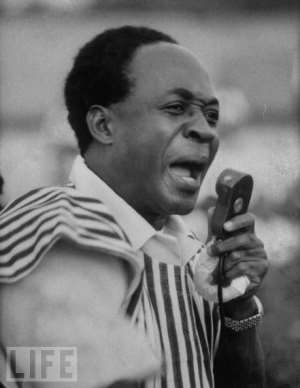
If the 24thof February, 1966 goes down as the darkest day in the history of Ghana and Africa, there is one shining star over the gloom of that day – Major-General Charles Mohammed Barwah, who preferred death to surrendering and joining the traitors. Barwah's heroic martyrdom for his country and constitutional rule is unprecedented and unequaled in the annals of our country. Indeed, within days of the coup, several top officials, both military and civilian, defected and joined the military junta.
In the early hours of that sad day 48 years ago, as the imperialist-sponsored coup took place, 25 soldiers led by the traitor, Colonel E.K. Kotoka, headed for the residence of the Chief of General Staff, Major-General Barwah. There seven soldiers on guard duty were executed. Kotoka, having gained access, demanded that the General surrender and join the conspirators. Barwah refused, affirming his allegiance to his Commander-in-Chief, Nkrumah, the constitutional order and the republic. He was murdered in front of his wife and children by Kotoka.
Kotoka's murder of Major-General Barwah was cold-heartedly calculated. He was known not to get on well with General Barwah. Indeed, the General had accused Kotoka of “putting his tribal interests before his military duties.” Kotoka deeply resented the General's rapid promotion by the Osagyefo.
Who was General Barwah?
General Ocran, one of the NLC conspirators described General Barwah, as a “Sandhurst-trained officer of outstanding merit and a real gentleman.” This impartial view undoes the basis for the grudge borne by Kotoka that Barwah was undeserving of the promotions Nkrumah bestowed upon him. It is clearly established that General Barwah was in the first place a highly-trained and qualified officer. The son of an army Sergeant, he was the first soldier from the North to pass the Officer Training Course in 1947. Above all, he was a completely loyal soldier and imbued with a nationalistic spirit as opposed to Kotoka's tribalist tendencies, which he had condemned. Barwah replaced Ankrah as Deputy Commander in 1964, and was Acting Commander of the Army at the time of the coup.
The coup itself was the culmination of intense planning by the CIA aided and abetted by MI5 (the British Intelligence Service) and the infamous French Intelligence apparatus operating under the political cover of the Quai d'Orsay and headed by Jacques Foccart , the mastermind of several African coups. John Stockwell, ex-CIA agent, former station chief in Ivory Coast and station chief in Angola at the time of the civil war, revealed in his book published in 1978 that the planning was largely the work of Howard T. Banes, the Accra CIA station chief, working undercover as a Political officer at the US embassy.
Banes had boasted to Stockwell about his role and how there was no paper trail to be found that would incriminate the United States. The New York Times was able to conduct its own investigation to establish the veracity of Stockwells revelations in his book from first-hand, inside sources. Declassified documents from the US government itself also attest to its complicity.
Furthermore, the late Ivorian President, Houphouet Boigny, revealed in an interview with Afrique-Asie magazine that the coup leaders met several times in the Ivory Coast, under his auspices and that of of the Western Intelligence services to prepare and finalize plans for the coup.
In the beginning the troops under Major Afrifa and Colonel Kotoka were told they were undergoing a routine exercise. As they approached Accra they would be deceived with an elaborately-concocted tale that the President, Osagyefo Kwame Nkrumah, intended sending them to fight in Vietnam and Rhodesia (now Zimbabwe). However, the Osagyefo had left Ghana with 3,000,000 pounds and would not return.
The army was therefore being called upon to save this country from chaos. It is said that using the ruse of distributing vitamins for general well-being, the troops were given psychotropic drugs of an unknown nature that rendered them “high” and aggressively violent.
The bitter fruits of the treachery and treason of 24thFebruary, 1966 are still being harvested in Ghana. On this day we do not mourn. We celebrate the noble sacrifice of the heroic martyr, General Barwah. For as the Osagyefo wrote:
“We scorn death, knowing we cannot be defeated!”
Long live General Barwah, heroic martyr of the first republic, selfless defender of the constitution!
Long live all resisters and victims of the imperialist coup!
Nkrumah never dies!
Forward Ever!




 We’ll no longer tolerate your empty, unwarranted attacks – TUC blasts Prof Adei
We’ll no longer tolerate your empty, unwarranted attacks – TUC blasts Prof Adei
 Bawumia donates GHc200,000 to support Madina fire victims
Bawumia donates GHc200,000 to support Madina fire victims
 IMF to disburse US$360million third tranche to Ghana without creditors MoU
IMF to disburse US$360million third tranche to Ghana without creditors MoU
 Truck owner share insights into train collision incident
Truck owner share insights into train collision incident
 Paramount chief of Bassare Traditional Area passes on
Paramount chief of Bassare Traditional Area passes on
 Two teachers in court over alleged illegal possession of BECE papers
Two teachers in court over alleged illegal possession of BECE papers
 Sunyani: Victim allegedly shot by traditional warriors appeals for justice
Sunyani: Victim allegedly shot by traditional warriors appeals for justice
 Mahama vows to scrap teacher licensure exams, review Free SHS policy
Mahama vows to scrap teacher licensure exams, review Free SHS policy
 Government will replace burnt Madina shops with a new three-story, 120-store fac...
Government will replace burnt Madina shops with a new three-story, 120-store fac...
